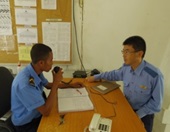Commissioner-General's Secretariat

SUPPORT FOR CRIME VICTIMS
1. Support for Crime Victims
The police are working to enhance diverse aspects of support for crime victims and their families, or bereaved families. The following are examples of police support for crime victims and their families:
A. Benefit Payments to Victims
The national government makes benefit payments to victims and their bereaved families for serious harms caused by crimes.
B. Providing Information for Crime Victims
The police have prepared a brochure which outlines the investigative proceeding and their support system for the crime victims.
C. Reducing Victims’ Burden
Crime victims and their families not only suffer physical, emotional, or financial harms as direct results of the crimes, but also undergo a wide range of harms through secondary victimization. Police officers receive training on treatment of victims to reduce their burden. Police stations have rooms that are furnished, lighted, and decorated where victims can consult with police officers in a relaxing atmosphere. The police also provide many other support services for victims including accompaniment to hospitals or to courts upon request.

Special vehicle for supporting crime victims

Accompanying victims to hospital
D. Providing Counseling for Victims
To help alleviate the emotional injuries of victims, the police, in cooperation with psychiatrists and private counselors, provide counseling services for victims.

Counseling by police officers
E. Securing Safety of Victims
The police take various measures for protection of victims including enhancement of patrols.
2. Cooperation with Private Organizations for Victims Support
Private victim-support groups provide services including counseling and accompaniment to hospitals or to courts, and carry out public awareness-raising activities. The police and private groups work together in order to support victims and achieve their recoveries.
Policies for Crime Victims,etc.
- Pamphlet "Support for Crime Victims by the police"(947KB)(November 2019)(SUMMARY)
- Fiscal Year 2022 Policies for Crime Victims, etc.(June 2023)(SUMMARY)
- The Fourth Basic Plan for Crime Victims,etc.(496KB)(March,2021)
- The Fourth Basic Plan for Crime Victims,etc.(365KB)(March,2021)(SUMMARY)
INTERNATIONAL COOPERATION
The Japanese police experts were also sent to Timor-Leste in 2011 and from 2013 to 2015 to provide advice and guidance on community policing.

From 2011 to 2014, judo instructors from the Japanese police were sent to Turkey to train the Afghan police officers in a program hosted by the Turkish police. In 2015, short-term experts from the Japanese police were sent to Turkey to support training for young Afghanistan female police officers.



| Internatonal Disaster Relief Activities by the Jananese Police | |||
| Month & Year | Country/Region | Disaster | Dispatched |
| June 1990 | Iran | Earthquake | 6 persons |
| July 1990 | Philippines | Earthquake | 11 persons |
| December 1993 | Malaysia | Building collapse | 11 persons |
| October 1996 | Egypt | Building collapse | 9 persons |
| January 1999 | Colombia | Earthquake | 15 persons |
| September 1999 | Taiwan | Earthquake | 45 persons |
| May 2003 | Algeria | Earthquake | 19 persons |
| February 2004 | Morocco | Earthquake | 7 persons |
| December 2004 | Thailand | Tsunami | 20 persons |
| October 2005 | Pakistan | Earthquake | 15 persons |
| May 2008 | China | Earthquake | 20 persons |
| October 2009 | Indonesia | Earthquake | 21 persons |
| February 2011 | New Zealand | Earthquake | 43 persons |
| April 2015 | Nepal | Earthquake | 23 persons |
| September 2017 | Mexico | Earthquake | 23 persons |
| February 2018 | Taiwan | Earthquake | 2 persons |
Responding to the Surge of Foreign Visitors to Japan
International Cooperation
The mechanism of the Police Detention Administration
Police Info-Communications

Police Info-Communications
The Info-communications Bureau operates and maintains the police info-communications infrastructure 24/7, enabling emergency response to all crimes, accidents and disasters throughout Japan.
The Bureau also strives to improve the administrative services and support for front-line police activities through development of unified police information systems and centralized databases at the National Police Agency to facilitate information sharing across all Prefectural Police Headquarters.